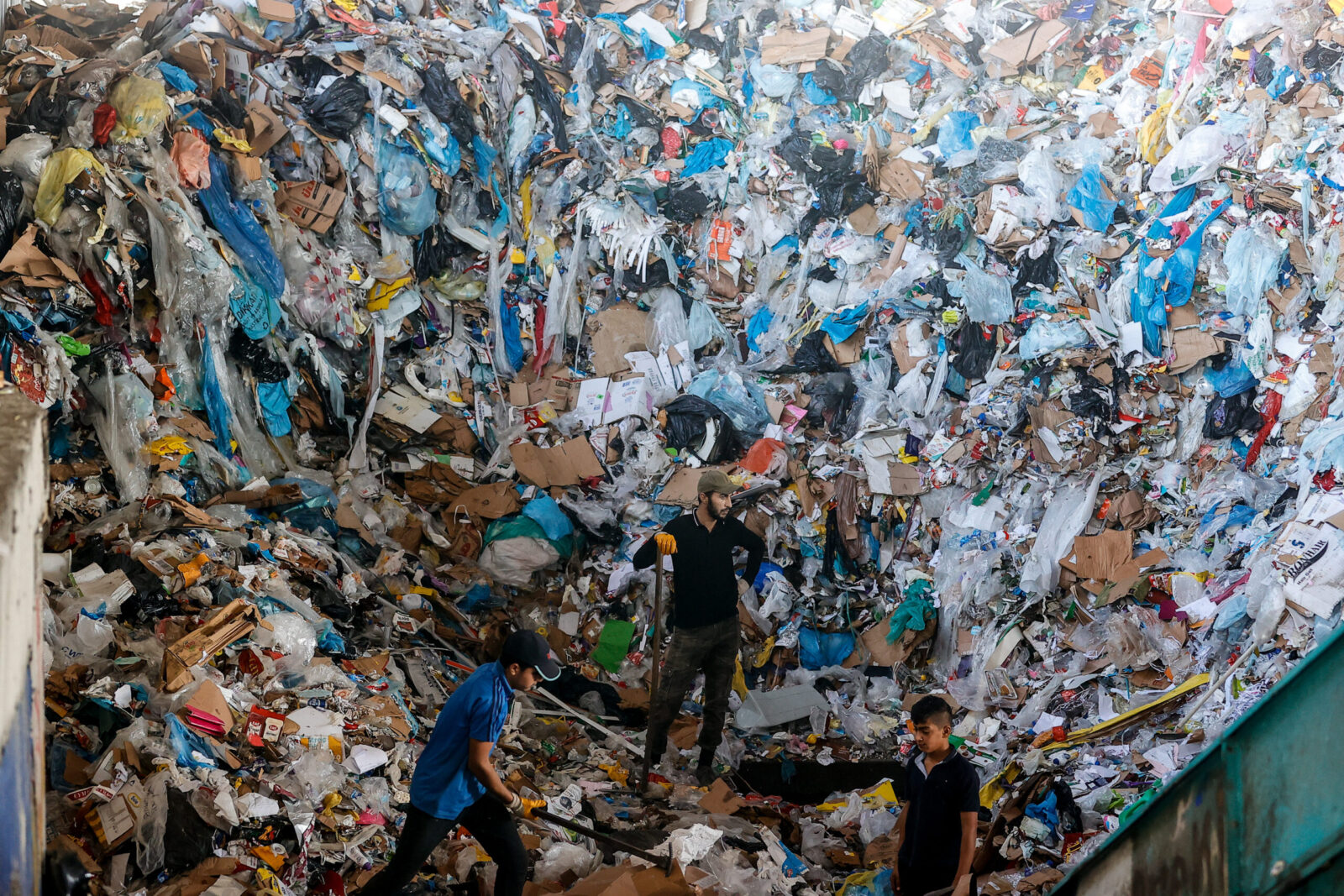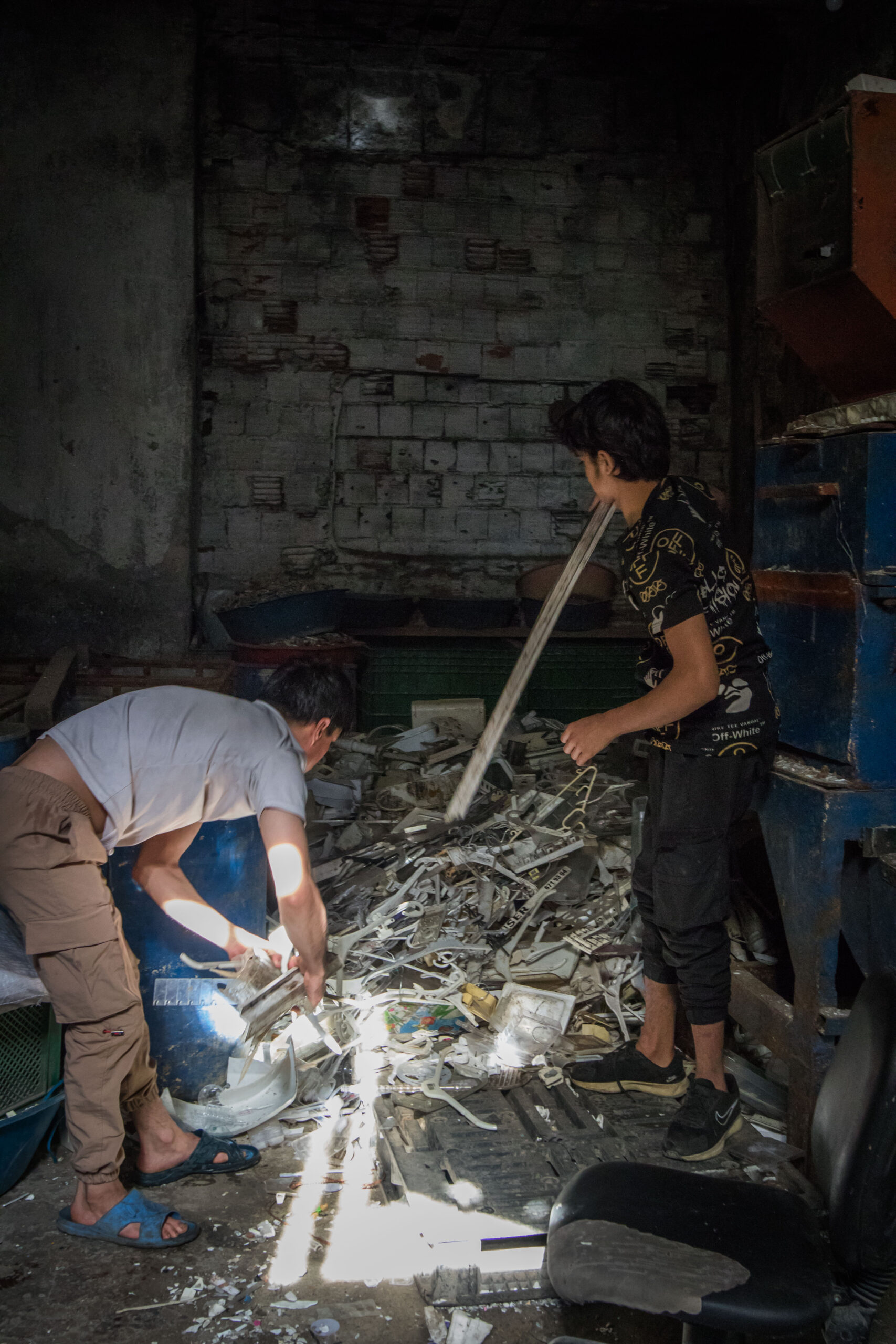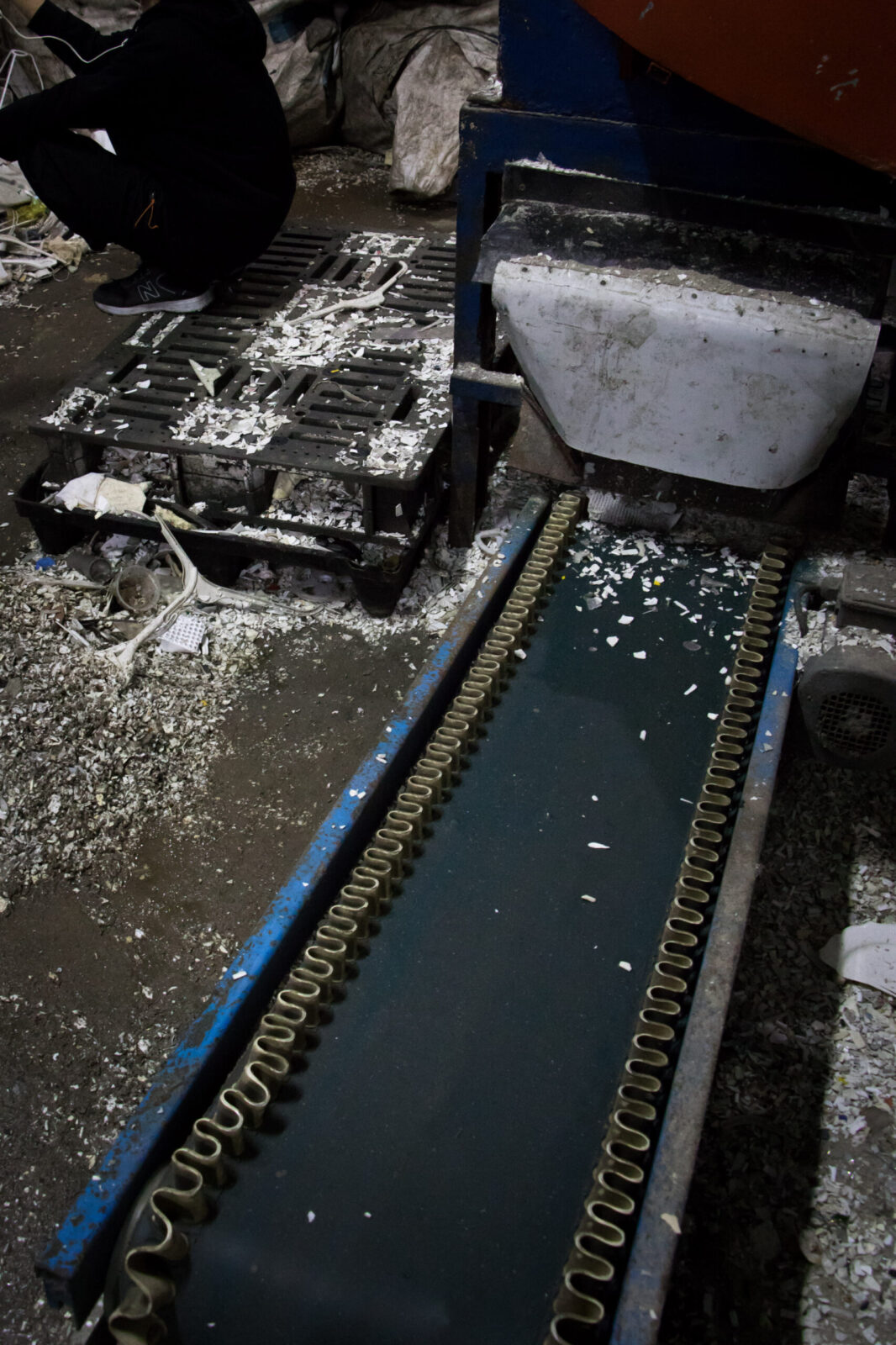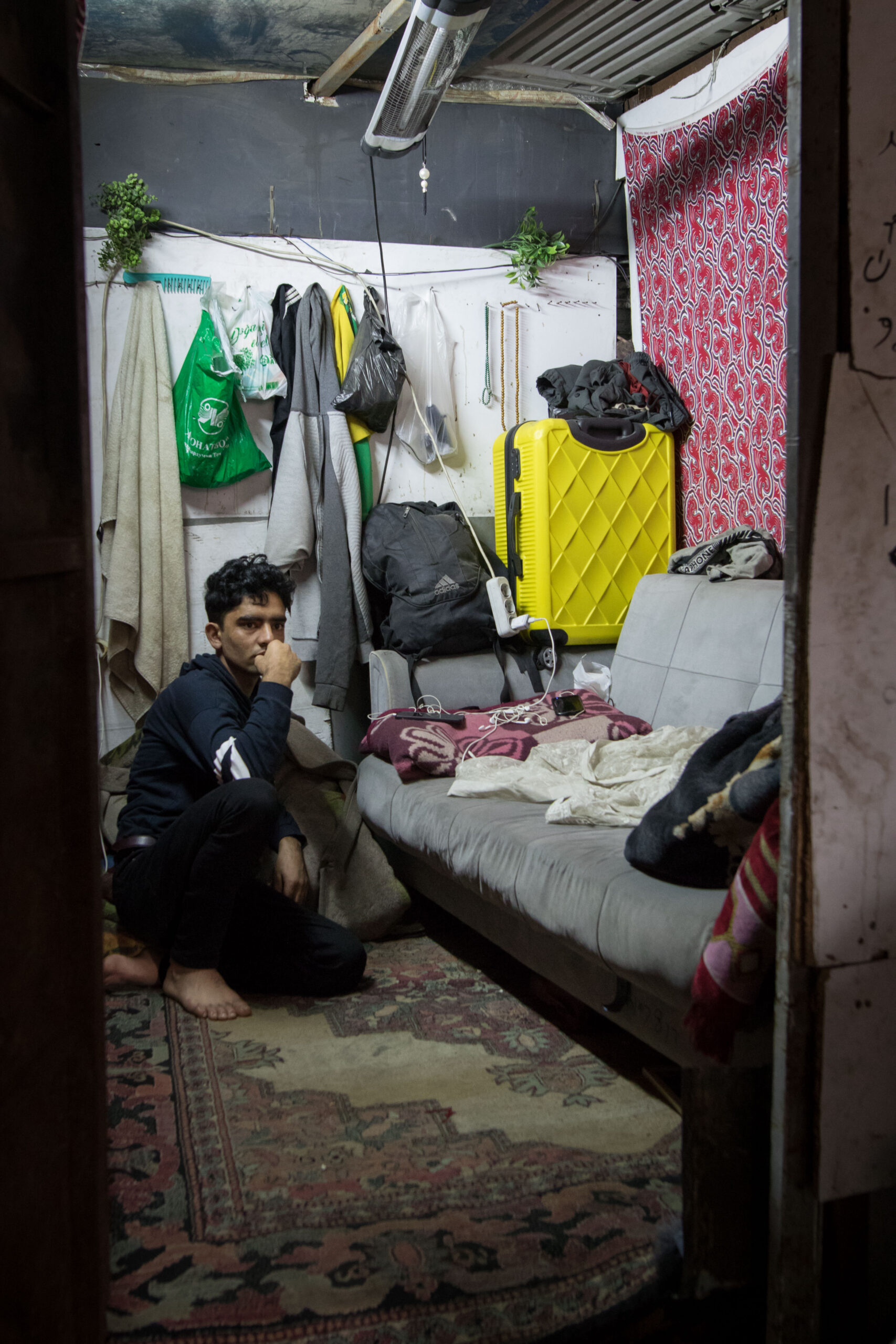A version of this article was originally published in Dutch for De Groene Amsterdammer.
In May 2021, at just 13-years old, Hayat found himself wandering aimlessly on the streets of Istanbul, dazed and a little terrified.
Workers separate waste at a recycling factory, Antalya, Turkey, 2021. Mustafa Ciftci/Anadolu Agency via Getty Images
A slight, fine-boned child, he cut a fragile figure amid the hard-edged city. Born into a farming family from the rural Khogyani district of Afghanistan’s Nangarhar province, Hayat had never experienced a metropolis on the scale of Istanbul. Bombarded by the sights, the sounds, the endless crowds and anarchic traffic, he was overwhelmed.
“It was like I was dreaming,” he told me in early 2023. “On that first day, I walked around for hours and hours, just staring at everything.”
Like millions of refugees, Hayat had escaped war and poverty to seek out a better life for himself and the family he’d left behind in Afghanistan. His story was familiar: His mother and two sisters were now depending on him after his father, a soldier in the Afghan army, had died. Thousands of Afghan refugees in Turkey could recount similarly tragic stories.
Nearly two years later, in the six-square meter concrete storage closet Hayat shared with two other Afghan refugees, Naseem and Khalid, that childlike wonder was gone. The storage closet was a dingy space set in the back of a plastic recycling factory in the Cebeci neighborhood, far out on Istanbul’s northwestern outskirts.
Over the three months I’d been visiting them—every Sunday, when their boss was away—Hayat, Naseem and Khalid had remained mostly stoic. None of the “boys,” as I’d begun to call them, had expected to be in Istanbul for so long. Their goal was Europe. And they certainly never expected to be living in a plastic recycling factory. But their predicament was common in Istanbul. Afghans have become the most vulnerable refugee population in Turkey, demonized by the Turkish media and targeted for arrest and deportation. In 2022 alone, nearly 50,000—mostly young men and boys—had been sent back to Taliban-governed Afghanistan.[1] To escape arrest, many Afghan men had gone underground.
What was a dire situation for them was a boon for the owners of small recycling factories in industrial districts like Cebeci. Plastic recycling has become a big business in Turkey after China banned plastic waste imports in late 2017. Prior to the ban, China was the primary destination for plastic waste from the world’s wealthy nations, taking in as much as 8.8 million tonnes a year.[2]
In the immediate aftermath of the ban, imports into Turkey spiked, jumping by more than 150 percent in 2018 compared to 2017. By 2023, the last year of available data, they were up nearly 250 percent.[3] Plastic waste imports into nations in Southeast Asia, including Indonesia, Malaysia and Vietnam, shot up even more dramatically.
None of these countries had the industrial capacity to deal with the influx. But they did have one thing that made them ideal plastic waste dumping grounds: a ready supply of cheap, easily exploitable labor. In Southeast Asia, that labor was mostly poor locals. In Turkey, it was refugees.
The Shifting Trade in Recycled Waste
China’s ban came at an ideal time for Turkey’s plastic recyclers. Less than two years before it was implemented, the European Union had signed a controversial migration deal with the Turkish government. Turkey was promised six billion euros, among other political guarantees, to keep refugees from crossing into Europe. At the same time, funding for Frontex, the EU’s border protection agency, had soared, swelling to over 754 million euros in 2022, an increase of nearly 300 percent since the deal was signed.
The results were predictable: refugee numbers in Turkey spiked from nearly 2.8 million at the end of 2015 to nearly 3.8 million by the end of 2017. The availability of cheap refugee labor has been key to sustaining Turkey’s burgeoning recycling sector. Much of the waste Turkey receives consists of low quality and contaminated plastics, dirty trash that often arrives in the country illegally. “The only way to make money out of these types of plastics,” Yeo Bee Yin, the former Malaysian Minister for Environment and Climate Change, pointed out in October last year during a webinar on the illicit waste trade, “is to be an illegal factory.”[4]

Hayat and Khalid load plastic into a dilapidated shredder at the plastic recycling factory where they live and work in the Cebeci industrial district of Istanbul. Photo courtesy of the author.
China’s decision to ban plastic waste imports, despite the economic windfall they brought, was responding to similar concerns. For years, the Chinese Communist Party had tried to clean up the trade, placing limits on the types of plastic it would take and demanding exporting countries do their part to reduce the levels of contamination. None of it was working. The lack of regulatory oversight at European ports failed to reduce the traffic in contaminated waste. Domestically, China’s vast supply of labor—and profit-obsessed factory owners willing to exploit it—made it an ideal destination, despite the massive damage it inflicted on China’s environment and human health.
When trade shifted to other countries in 2018, these problems shifted with it. In Cebeci, none of the refugee workers I spoke to knew, or really cared, where the plastic waste was coming from or how dirty it was. The factory where Hayat and his companions worked was a dark, dingy place. Tattered insulation dangled precariously from the ceilings; dirty rainwater leaked through cracks onto cinderblock walls, leaving behind mouldy stains and a musty stench. Any patches of the floors not covered by piles of plastic trash were encrusted with a layer of powder—a by-product of the shredder, which, when turned on, would belch out fine plastic particulates that filled the air with a toxic mist. Cebeci was packed with such factories: crumbling concrete and rusted metal siding surrounded by toxic waste dumping grounds where the worst of Europe’s plastic trash lay buried.
Hayat, Naseem, and Khalid, the factory’s only workers, toiled fourteen-hour days, six days a week under conditions that fit the UN definition of modern-day slavery. Their work was noxious and potentially fatal. Plastic waste would arrive on trucks, which the three would unload and divide into what was recyclable and what was not. They would hand feed the recyclable pile into an old, dilapidated shredder that spat out jagged, shark tooth-sized flakes. The flakes would then be washed in drums of putrid water and dumped into an industrial dryer. When turned on, the dryer would heat up and spin rapidly, emitting acrid fumes that invaded the lungs and settled on the skin like a sticky film. For their work, they were paid around 70 euros a month—low, even in Turkey’s economy. But their status as refugees meant there wasn’t much they could do. Whenever they complained, their boss threatened to call the police and have them deported. Besides, the boss told them, they were living in his factory for free. That should count for something.
The storage closet where they lived had no heating and was too small to accommodate all three of them. They took turns sleeping: one on the couch, one on the floor, the third crouched in a corner, waiting his turn. There was no proper toilet—just a hole in the ground connected to a sewage pipe—and no running water. They bathed once a week, on Sundays, when they could sneak over to another factory and fill up jugs of clean water.
The Myth of Plastic Recycling
If you believe the information videos put out by the recycling industry, plastic recycling is a neatly organized process: Plastic waste arrives in tidy bundles at sparkling clean factories where smiling workers deftly put it through a high-tech recycling process, producing gemstone-like plastic pellets ready to be shipped off to join what the industry euphemistically refers to as the circular economy.
According to a February 2024 report published by the US-based Center for Climate Integrity, the myth of plastic recycling is the product of “a decades-long campaign of fraud and deception about the recyclability of plastic” perpetrated by petrochemical companies. In much the same way the tobacco industry lied about the health effects of smoking, the plastic industry has actively obscured the fact that their products cannot be sustainably recycled.[5] “These efforts have effectively protected and expanded plastic markets,” the report concluded, “while stalling legislative or regulatory action that would meaningfully address plastic waste and pollution.”[6]
The report’s conclusions paint a disturbing picture of Europe’s recycling efforts. According to the European Parliament, less than a third of plastic waste produced in Europe is recycled and, as the Center for Climate Integrity’s researchers showed, most of it can only be recycled once. Half of all European waste enters the global trade in plastic waste, packed into bales, loaded onto shipping containers and sent off to ports in Rotterdam and Antwerp. It is a massive industry, generating billions of dollars a year. It’s also a dirty business, filled with profiteers and small-scale operations that are almost impossible to regulate. Attempts to clean it up have mostly failed. Meanwhile, Europe’s garbage continues to pile up in some of the world’s poorest countries.
After China’s exit, attempts were made to introduce more oversight within the plastic waste trade: In May 2019, for instance, plastic waste was added to the Basel Convention on the Control of Transboundary Movements of Hazardous Wastes and their Disposal. The new measures included “a set of actions for preventing and minimizing the generation of plastic waste, improving its environmentally sound management and controlling its transboundary movement; reducing the risk from hazardous constituents in plastic waste; and public awareness, education and information exchange.”[7]
The result, according to Shanna Mehlbaum, was a trade environment dominated by “cowboys who don’t care about regulations and just want to make money.” Mehlbaum is an independent criminologist and doctoral candidate at Tilburg University studying the international trafficking of waste from the Netherlands—the largest exporter of plastic waste in the EU in 2021 and, per capita, the largest in the world.[8]
In her experience, Mehlbaum told me, there are just too many ways to get around the regulations. Fraudsters can, for instance, import waste into the Netherlands and then re-classify it as a reusable commodity, like processed plastic pellets. “Then you can sell it as a secondary raw material and you fall into another regime,” she said. “It wouldn’t be traced at all in the same system or leave a paper trail in the waste management system.”
The only way to prevent such fraudulent activity is a robust monitoring regime, she added. But according to the Netherlands’ Human Environment and Transport Inspectorate (ILT)— responsible for monitoring the transportation of waste materials in the Netherlands—customs officials only carried out a total of 624 inspections on plastic waste exports in 2022.[9] This number is not nearly enough, Mehlbaum said, to bring illegal trafficking under control.
One of the ILT’s own senior inspectors, Huib van Westen, noted that the scale of waste exports from the Netherlands—in the range of 1.5 million shipments a year—makes it almost impossible to monitor how much hazardous waste is being illegally trafficked. “To be honest,” he said, “if no one is informing us, we have no idea what is being shipped.” What’s needed are more physical inspections, but that would require massive resources.
The ILT, for its part, claims that more than 80 percent of plastic waste exports to countries like Indonesia and Turkey consist of “easily recyclable waste film.” But the figure is hard to verify. When I asked the ILT how it came up with the number, it was vague, saying it is “based on customs data” and inspections. The logic, though, is perplexing. The customs data, as Mehlbaum said, is unreliable. And as van Westen, the ILT’s own senior inspector pointed out, the number of inspections is not nearly sufficient to provide a clear picture of what’s really going on. In addition, the regulatory regime for plastic waste exports allows for two percent contamination in any shipment of waste.
Dr. Delphine Lobelle—an expert in physical oceanography who has researched plastic waste flows in the Netherlands—told me it is impossible to know if the two percent rule is being followed without opening up a significant number of shipping containers and testing the plastic waste they contain. Large amounts of contaminated waste, or mixed plastics that are difficult to recycle, can easily be hidden in what the ILT classifies as “valuable raw materials.”
“This is the basic problem,” Mehlbaum told me. “There is money to be made and the regulations are difficult to enforce. The system is not working. I’ve been studying this for years and I just keep coming back to this point: We have all of these regulations but it’s so easy to commit fraud.”
A Dangerous Industry
On a Sunday in November 2022, early on during my weekly meetings with the Afghan refugees at the plastic recycling factory, we were seated around a heater I had purchased for the storage closet, warming our hands and talking. Hayat was tucked away in a corner, as he usually was, scrolling through his mobile phone.

Hayat takes a rest from shredding plastic waste to call his mother in Afghanistan at the plastic recycling factory where he lives and works in the Cebeci industrial district of Istanbul. Photo courtesy of the author.
Suddenly, he looked up. “Did you hear about what happened to Arifullah Fazli?” he asked. “He worked at a different factory, just around the corner from us. He died in September. He climbed into a shredder to pull out something that got stuck in the blades. Someone accidentally turned the machine back on while he was still inside. I have pictures. Do you want to see?”
Without waiting for me, he began scrolling rapidly through his mobile phone. He stopped and stared momentarily, blank-faced, before turning the screen to me.
On it was a scene from what looked to be some kind of industrial yard. In the foreground was a pile of plastic waste—mostly single-use plastic bags. In the center of the frame stood a young man, hair closely cropped, wearing a black t-shirt and black jeans, holding a metal rod with a hook on one end. He appeared to be gesturing to someone outside the frame. Behind him was the body of Arifullah Fazli, two bloodied stumps where his legs used to be.
“The owner of the recycling factory tried to throw the body out with the trash,” Hayat said, turning the phone and looking at the image one more time, “but other refugees managed to call the police before he could.”
The image was jarring, not only because of its gruesome contents but because of its moral implications. After months of investigation, working with a Turkish lawyer, I was finally able to confirm in September of 2023 that a case had been filed against Cemil Onemli, the factory owner, but it was sitting untouched at the prosecutor’s office. Fazli’s body, Yuksel Yilmaz, the president of the Istanbul Recyclers Association told me, had been returned to Afghanistan. “The case is ongoing so we cannot comment on it,” he said.
According to the case file, Onemli denied Fazli worked at his factory, claiming one of his Turkish employees had found a dead body in the trash and called him. The lawyer, who requested anonymity because of the sensitivity of the case, told me the file was still at the forensic institution for investigation, a full year after Fazli’s death. “The prosecutor cannot close the file because there’s definitely a crime here, at the very least the crime of neglect,” she said. “I’m working with the bar association to make sure they don’t close the case.”
In early February, I received word from the lawyer that a court case was proceeding against Onemli on charges of involuntary manslaughter, but it faced an uphill battle. According to the lawyer, the case lacked evidence. The fact that the body had been returned to Afghanistan, even as the forensic investigation was ongoing, did not bode well. A proper investigation had not been conducted into how Fazli had died, and at this point, more than a year later with the factory still operating, the odds of finding any new evidence were next to none.
A 2022 Human Rights Watch report documented the litany of health issues faced by workers in Turkey’s plastic recycling facilities, as well as families living in the surrounding areas, ranging from chest pains and shortness of breath to headaches and body rashes. The report warned that the situation is only going to get worse. “[P]lastic production is projected to triple from 2015 to 2060,” it said, “largely driven by the world’s largest oil and gas producing companies, alongside fast-moving consumer goods companies.” [10]
Dagevos worries that these figures, combined with the growing number of refugees in the world, will lead to greater human catastrophe in places like Turkey, as well as other countries with substantial refugee populations.
Interrupting the Circular Economy
In November 2023, the European Commission adopted changes to the Waste Shipment Regulation (WSR) that will ban all exports of plastic waste to non-OECD countries by 2026.
The measures, however, fail to get to the core of the problem. They contain loopholes that allow for the eventual resumption of exports under certain conditions. Considering how hard it is to regulate the illegal waste trade, leaving a backdoor open that experienced fraudsters can exploit could spell a return to the status quo. More worryingly, the new regulations do little to curb the export of plastic waste to OECD countries like Turkey.
Indeed, Turkey was not the only OECD country to experience a spike in plastic waste exports after the 2017 China ban. Exports to Mexico, another country wealthy nations have paid off to house refugees (in this case the United States) jumped 300 percent.[11]
Dagevos, Mehlbaum and Lobelle all agree that any system that continues to treat plastic waste as a tradeable commodity is ultimately doomed to fail. What’s needed instead, they say, is a total ban on plastic waste exports outside the EU. That option was available to the European Commission when it was formulating changes to the WSR, but it faced stiff opposition from some European countries, including the Netherlands.

Naseem in the converted storage closet he shared as a bedroom with Hayat and Khalid. Naseem has managed to leave Turkey, arriving in Europe in the summer of 2023 after more than a year living and working in the factory. Photo courtesy of the author.
“Listen, we all say we want a sustainable economy but it’s hypocritical,” Ben Kras, CEO of Kras Recycling, a Netherlands-based plant, told me. “We are recycling but no one is buying our materials because it is too expensive. People prefer raw materials coming from anywhere else in the world because it is cheap. This is all really about money.”
On that point, Dagevos agrees. Plastic recycling companies in wealthy countries like the Netherlands simply can’t compete against cheap recycled plastics from countries like Turkey, even virgin plastic from China. “They’re all going bankrupt,” he said. “Virgin plastic is still cheaper than recycled plastic or biodegradable plastic alternatives. This is a petroleum-based product, and if oil prices stay low, it will always be cheaper to produce new plastic in places like China.”
China, ironically—though perhaps unsurprisingly—leads the virgin plastic industry. After banning plastic waste exports, it proceeded to increase its virgin plastic production capacity by 7.5 million tonnes between 2019 and 2021, with plans to continue increasing capacity for at least the next five years.[12] Single-use plastics produced from fossil fuels are expected to rise by 17 million tonnes to 148 million tonnes over the next three years, according to the 2023 Plastic Waste Makers Index, published by Australia’s Minderoo Foundation. Plastics from recycled sources, meanwhile, are expected to reach 4.7 million tonnes in 2027, an increase of three million tonnes compared to 2021, far from the goal of circularity promised by the petrochemical industry.[13]
Regulations are the only way to reverse virgin plastic’s momentum, Dagevos, Kras and the authors of the Minderoo Foundation’s report all say. Banning plastic waste exports, for instance, would force EU nations to increase their own recycling capacity and accelerate the transition to recyclables. Increasing tariffs on imported virgin plastic, making the price of biodegradable alternatives more competitive, would also have a positive impact. But the latest round of changes to the WSR focus instead on the waste trade itself, punishing bad behavior and rewarding the good, an approach that has, in the past, failed to produce results.
In the meantime, the victims of the trade continue to suffer. As more barriers go up and the refugee population grows, the pool of cheap, exploitable labor is growing along with it. Migration experts are already sounding the alarm bells over of the burgeoning number of refugees being trafficked for cheap labor, including in the plastic recycling industry.
The last time I spoke to Hayat, in late December last year, he and Khalid were still working and living at the factory in Cebeci. The situation was tense. Police raids were on the rise and, fearing the loss his cheap workers, their boss had transferred the recycling operation to the factory’s basement, an even dingier space with no ventilation whatsoever.
But there was also some positive news: Naseem had left Turkey and successfully crossed into Europe. Hayat and Khalid were also relieved that at least a case had been brought against the factory owner involved in Fazli’s death, whatever the outcome might be. As for the debates over the plastic waste trade playing out in Europe, they were less sanguine. Hayat just laughed. “Maybe I’ll end up recycling something Naseem throws out,” he mused.
Khalid was more fatalistic. “I don’t think the people in Europe really care about us,” he said. “If they did, they wouldn’t leave us to suffer in a place like Turkey.”
[Adnan Khan is a freelance journalist based between the Netherlands and Turkey.]
Endnotes
[1] “‘No One Asked Me Why I Left Afghanistan’ Pushbacks and Deportations of Afghans from Turkey,” HRW Report, November 18, 2022.
[2] Based on data reported by the Chinese government to the UN Comtrade database, commodity code 3915 (waste, parings, scrap, of plastics); https://comtradeplus.un.org/TradeFlow, accessed May 30, 2024.
[3] Based on import data reported by Turkish authorities to Comtrade.
[4] “Illegal Waste Trade: What are we wasting our time on?,” YouTube, October 20, 2023.
[5] “The Fraud of Plastic Recycling,” Center for Climate Integrity, February 2024.
[6] Ibid.
[7] “Basel Convention: Controlling transboundary movements of hazardous wastes and their disposal,” May 2019.
[8] “Netherlands Pivotal in Global Export of Plastic Waste to Non-Western Countries Report Finds,” Plastic Soup Foundation, September 2022.
[9] “Hoogwaardige grondstoffen naar verre landen door geringe vraag in EU,” Netherlands’ Human Environment and Transport Inspectorate, December 7, 2023.
[10] “‘It’s As If They’re Poisoning Us’ The Health Impacts of Plastic Recycling in Turkey,” Human Rights Watch, September 21, 2022.
[11] See UN Comtrade.
[12] “Plastic Waste Maker Index: Key Findings,” February 2023, Minderoo.
[13] Ibid.
